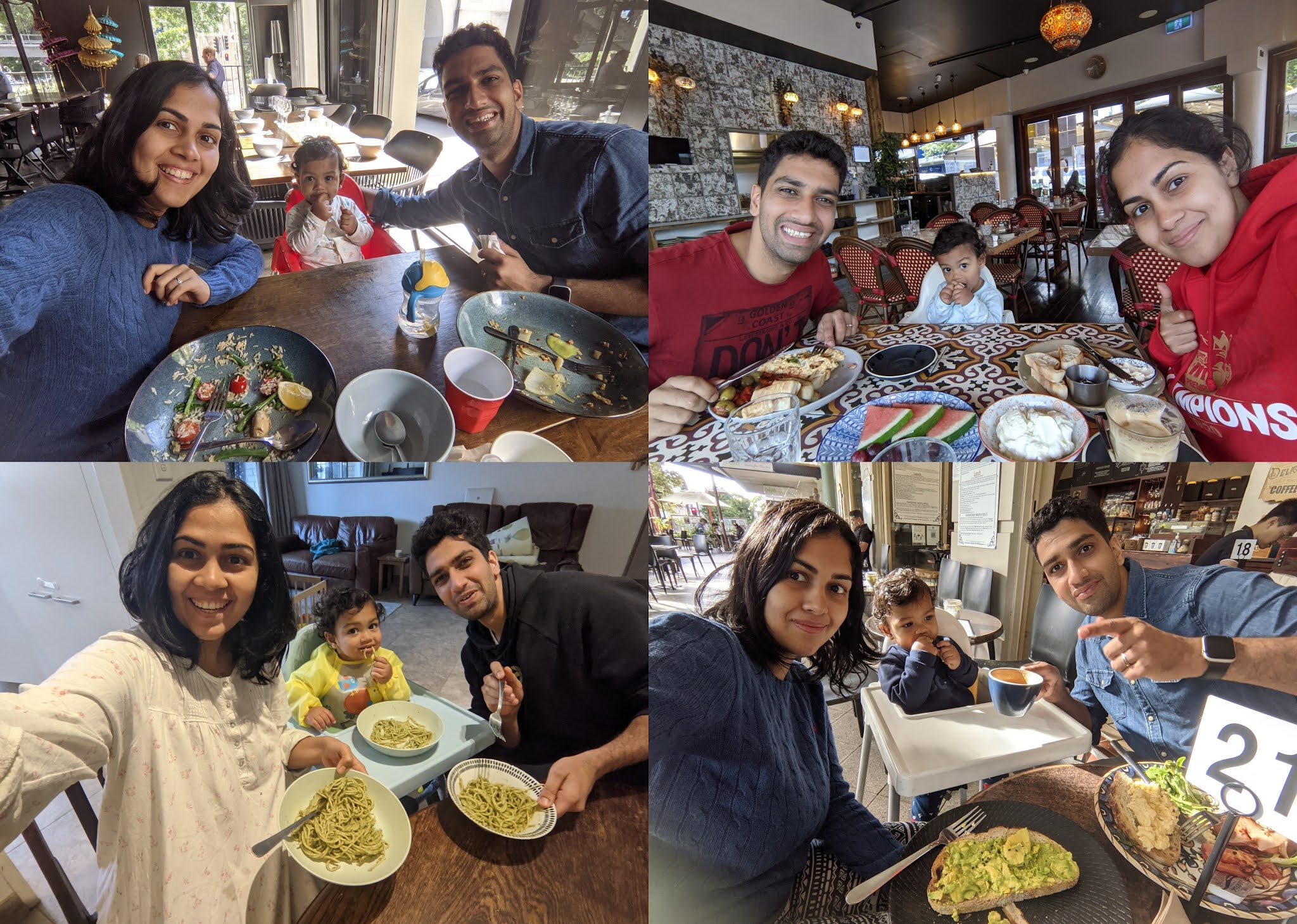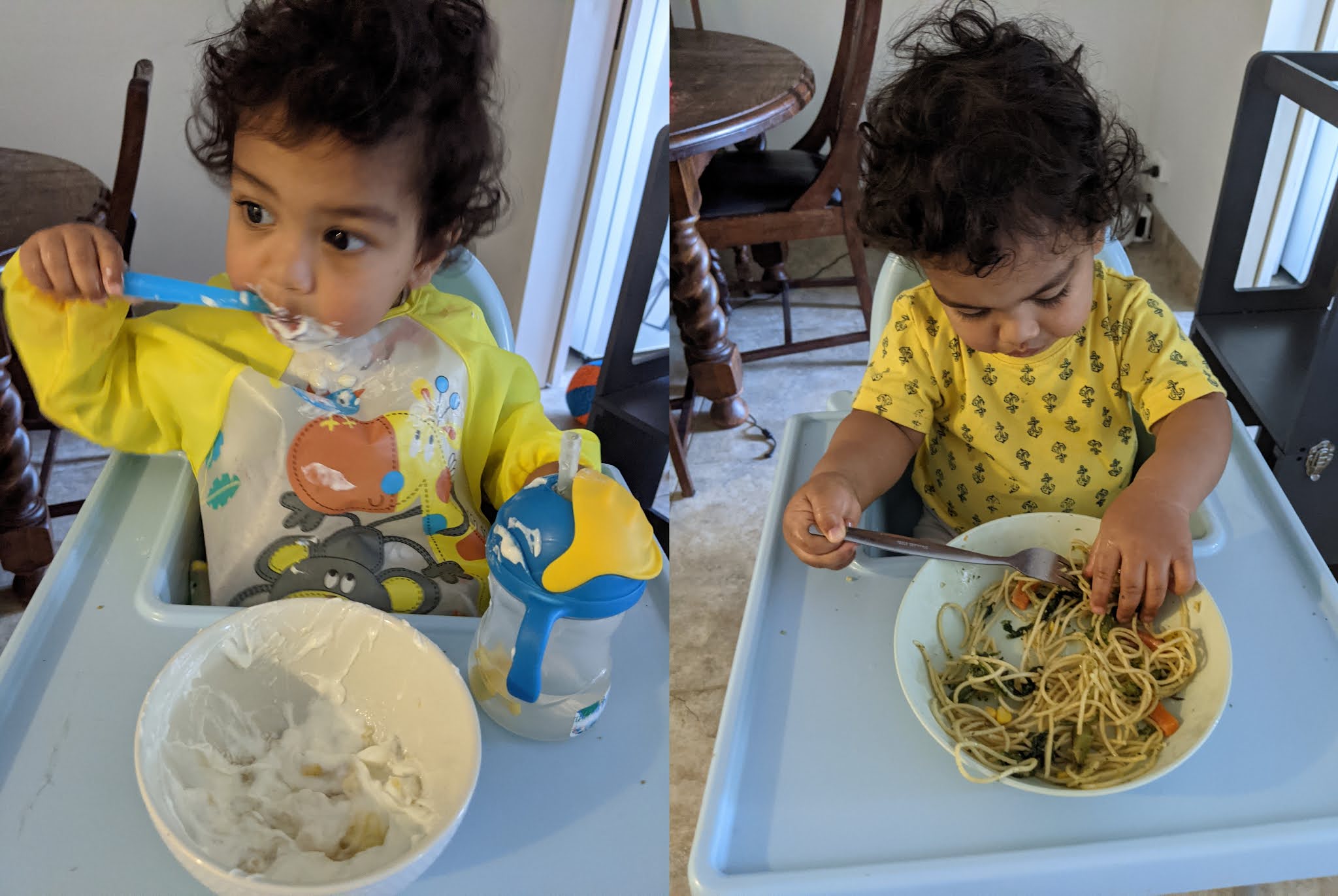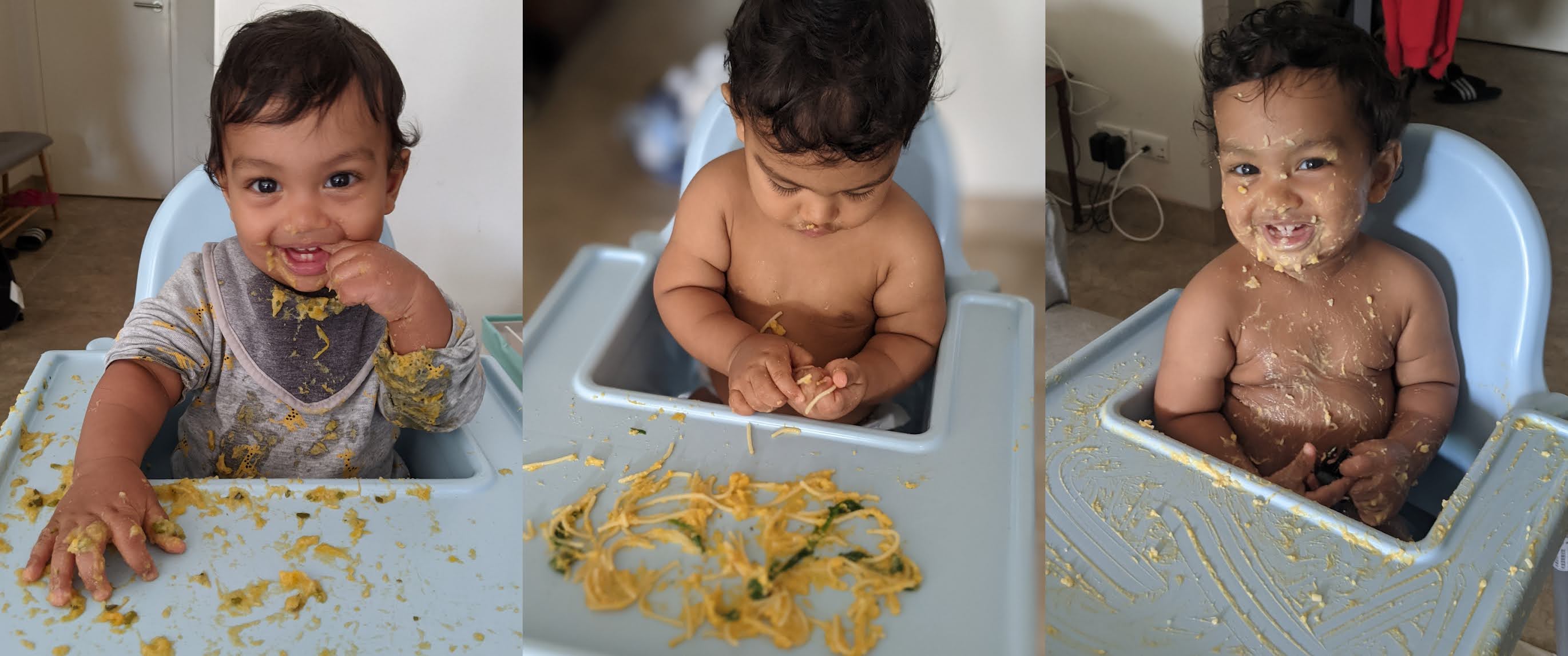Hello everyone!
Today's post is a highly, HIGHLY requested one by a lot of fellow mums who follow me on Instagram. I have been asked time and again how I got Neel to eat on his own, whether I started with purees or whether we went ahead with baby-led weaning and so on. In today's post, I'm going to be sharing our journey so far, how we got to where we are today, some tips and tricks that has worked for us and when to just let go! Before we get started, I'd like you guys to take a look at my blog post on how we started solids just to get you a brief idea. Get yourself a cuppa or something, because this one's going to be a long post! Also, do make sure you follow me on Instagram (@handonthehip) and check out my highlights "Neel's Meals" where I share daily updates on what my boy eats. Before you proceed, I also want to let you all know that I am no expert, I do not have a medical degree and I am only sharing my story with you all.
As you all know, Neel had reflux in the initial months and hence, we were asked to start solids at 4 months. Each day I'd make a simple bowl of vegetable or fruit puree for my little boy who always devoured anything that was offered to him. In no time, we moved on to rice, cereal, lentils, khichdi and what not. Back then I had no idea that babies as young as six months or even younger could feed themselves! I was intrigued by the concept but wasn't brave enough to try something on my own because I was afraid of choking hazards and wasn't too keen on the mess that would follow. I was quite comfortable feeding him purees or mashed food and had no idea how it would make my son dependent. Neel would eat pretty much everything that was spoon-fed to him at that age! I did try offering him some eggs and steamed carrot sticks when he was about 4-5 months old and the poor little baby struggled to even bring it to his mouth. Clearly he wasn't ready! However, I did invest in a fruit feeder in the early days and when Neel was about 6 months old, he would eat all kinds of fruits on his own in his feeder. I also would give him some of those store bought baby snacks (puffs) and he instantly put it in his mouth. He once also ate some idli all by himself at Saravana Bhavan. I should have taken the hint and given him more finger foods, but it still didn't strike me. When he was about 7 months old, I gave him a strawberry just to see where we stand and he loved the experience of eating it on his own! I was ecstatic but didn't have any information to proceed and was under the impression that it's not allowed or encouraged.
We were doing extremely well with purees and when Neel was about 8 months old, I happened to go out to hang out with the other mums and bubs from the mother's group. I noticed that a boy of Neel's age was eating a peanut butter sandwich all by himself! All the other mums were even talking about how their bubs were big on finger foods and were refusing purees. That's when I felt like I didn't get the memo. I felt a tiny bit of mom guilt that day. Did I not provide my child with enough opportunities to acquire this skill? Or is he just not ready yet? I immediately rushed home and started doing my research while Neel went down for his nap. I made a chikpea and potato patty and offered it to Neel for his afternoon snack. He munched on it like a pro! It blew my mind to see how he was tearing pieces of the patty with his hands and putting it in his mouth! That gave me a ton of confidence and within a week, Neel had eaten all kinds of pancakes, patties, fruits, berries, dosa, cheese and what not and ALL BY HIMSELF (Video: Neel's First Week of Finger Foods)! And that's when we transitioned from spoon-feeding to baby-led weaning!
What exactly is baby-led weaning? How does it benefit my baby?
a) You are teaching your baby a skill that will help him be independent at a very early age.
b) Eating finger foods at an early age can help your baby learn how to chew.
Can I do both spoon-feeding and baby-led weaning?
Of course! That's exactly what we did when we first started! While he was focusing on feeding himself in the initial days, I still topped him up with purees if I felt that he was still hungry. Some of his meals were purees too.
What are the tools I need to get started?
You'll need a high chair, a bib, some easy finger foods that are age appropriate, weaning spoons and bowls and a hungry bubba! Although I did invest (still do) in a lot of toddler cutlery, my son always insists on eating using adult spoons, forks and bows!
What is the right age to start?
That totally depends on you and your bub! My bub seemed ready at 8 months and I was ready to experiment too. They say that 6-12 months is the best time to establish good habits and I couldn't agree more. If you think your baby isn't ready, try again after a few days. And remember, it's never too late to start either!
Don't babies need teeth to eat finger foods?
Nope, just strong gums! :)
Is it easy to transition from spoon-feeding to self-feeding?
Nothing is ever easy with babies! That doesn't mean you don't try! If your baby is grabbing food from your plate, then your baby is definitely ready to feed himself. When my son showed even an inkling of interest, I took that as a sign and got busy in the kitchen... haven't stopped since! :D
How do I know if my baby is full?
Babies know how much they want to eat. Some babies may be done with 2 bites, some may eat more. My son looks away when he's full or not interested in that particular food. If you think your child is still hungry, offer him something else to see if he accepts it or top him up with some puree.
How much food should I offer?
Every time I would ask my pediatrician this question, his answer would be the same, which was, "As much as he wants", but how was I supposed to know? In the initial days, my son never really knew when to stop! So to start with, I would always offer about 3-4 tbsp worth of finger foods or rice or purees and if he needed more, I'd offer him some fruits or more of the food that was made.
What does it mean if my baby is throwing his food?
It means that he has just discovered gravity! It's a phase and it shall pass! What I'd do is put that food back in his plate. Eventually, he understood that food is for eating and not to throw around.
What do I do if my child isn't sitting on his high chair?
When Neel was 11-12 months old, we went through a "high chair" rejection phase. Since he was trying to perfect his walking, he didn't want to be bound to one place. He would try to escape from the high chair immediately after he was placed in it. To overcome this and to not waste my time chasing him around the house with food, I set up a grazing station an placed pieces of his dosa or bread in a bowl. Every time he'd get hungry, he'd pick up a few pieces and eat it while he was playing. Now, please note that this could be a choking hazard and you may need to use your best judgement to decide how safe or unsafe it is. I also let him sit on the floor or on his seat/couch and eat some of his snacks. I am very flexible with where he eats as long as he's eating!
How do I increase my child's appetite?
2) If your baby is under 12 months and is heavily breastfed, then reduce breastmilk consumption which will help increase solids intake.
3) If your baby is over 12 months and is drinking a lot of cow's milk, then make sure your stick to a maximum of 400 ml per day. This would make space in their tummy for more food.
How do I know what my child likes and dislikes?
It takes a lot of trial and error to get to a stage where you know for sure what your baby's safe food is. Safe food is that food item that your child will always open his mouth for. For example, my son can literally survive of blueberries and cow's milk if he had a choice. It's good to also note down what texture, color, taste your baby is inclining towards. For instance, Neel went through a phase where he liked patties and soon moved over to tiny pieces of food that he can pick up with his tiny fingers and eat. It's all about knowing what your child likes and building on it. Regarding dislikes, it's always a roller coaster ride! Today my child may enjoy a bowl of rice and a few days later, he may turn his face away for the same food. When he shows some disinterest in a particular type of food, I would offer it a few weeks later to see how he might react to it.
Do I need to have back-up food in case bub rejects the food that's been offered?
A lot of weaning experts suggest that you don't offer anything else, but as a mum it's instinctive to want to make sure your child has eaten well. In situations like this, I do offer him something else or some fruits or cheese or a corn cob that I know for sure he will eat. I don't believe in letting my child go to bed hungry since his next meal might be 13-14 hours later.
How do I know my child is getting enough nutrition and what should I avoid?
2) Monitor your bub's salt intake and limit it to 300 gm for toddlers because too much salt could cause kidney dysfunction! (Read: Salt Facts)
3) It's best to avoid added sugar and sugary food items because it can get tricky to get bubs to eat anything once they start eating sugary items. They can also cause cavities and come in the way of baby's sleep.
4) It's extremely important to limit dairy intake to 400-700 ml (includes milk, cheese, yoghurt, ghee, butter etc.) in young toddlers since it can hamper iron absorption and also fill them up not leaving any space for other food items.
How do I transition my baby to cow's milk?
Cow's milk should not be offered to babies under 12 months. It's also not mandatory for bubs to have cow's milk and dairy can be consumed in other forms like yoghurt, cheese etc. When Neel was 12 months old, I started offering him about 50-100 ml of cow's milk in his sippy cup diluted with 100 ml of water. Initially he developed diarrhea and once he got better, I would boil the milk and offer. Within a few weeks, his body got used to it and I started offering more and more milk. Now I offer about 300-350 ml of cow's milk per day since he also has other forms of dairy through the day.
How do I deal with stress when the baby isn't eating?
Initially, I would get really angry with my baby when he'd refuse food. I mean, come on, I only spent 397584 hours making that food! I would ask my husband to take over and get him to eat the food I had prepared with so much effort and love. Over time, I have realized that some days may be great, some not so much. I understood my son's preferences better and started working towards preparing meals that he might like. If things don't go as planned, I just offer him something else (which is usually fruits or bread) and plan better for the next day.
How do I get my bub to eat with a spoon or fork?
I was always concerned about this one because I didn't know how to make my bub eat rice or anything that needs to be eaten with a spoon. But at around 13-14 months, Neel started grabbing the spoon from my hand and trying to feed himself. Sometimes I go in with another spoon and feed him too, but over time, he started getting better. I would give him easy, runny food items to practice his spoon skills like yoghurt, porridge etc. Similarly, I would offer a fork when he'd eat penne or mac pasta or even chunks of veggies and he figured it out.
What are some of the reasons babies reject food?
2) Offering food when it's your bub's nap time can be quite annoying for babies! Do ensure that your little one isn't tired or sleepy before you offer food.
3) Always ensure that you keep the food on the high chair first before you place the baby. Babies don't like waiting for their food! If you need more time to prep for his meal, then give him something small to nibble on.
9:30 am Breakfast + Breastfeed
12 pm Lunch + Breastfeed
3 pm Breastfeed
5 pm Dinner + Breastfeed
7 pm Breastfeed
4:00 am Breastfeed
5 to 9 Months
8 am Breakfast
10 am Breastfeed
11:00 am Lunch
2:30 pm Breastfeed
3:30 pm Snack
5:00 pm Dinner
6:30 pm Breastfeed
4:00 am Breastfeed
9 to 11 Months
8 am Breakfast
11:00 am Lunch
2:30 pm Breastfeed
3:30 pm Snack
5:00 pm Dinner
6:30 pm Breastfeed
11 to 12 Months
8 am Breakfast
9:30 am Morning Tea
11:00 am Lunch
2:30 pm Afternoon Tea
5:00 pm Dinner
6:30 pm Breastfeed
12 to 15 Months
8 am Breakfast
9:30 am Morning Tea
11:00 am Lunch
2:30 pm Afternoon Tea + Cow's Milk
5:00 pm Dinner
5:30 pm Cow's Milk
6:30 pm Breastfeed
15 Months +
7 am - 8 am Breakfast
9:30 am Morning Tea + Cow's Milk
11:00 am Lunch
2:30 pm Afternoon Tea + Cow's Milk
5:00 pm Dinner
5:30 pm Cow's Milk
Breakfast - Oats Porridge/Banana Bread/PB and Cheese with Bread/Fruit Muffins or Slices/Dosa/Chila followed by some Fruits and Cheese
Snack - Fruits/Rice Crackers/Fruit Bars/Egg/Cheese/Muffins/Dosa/Cucumber/Beans/Peas/Corn/Bread with PB or Almond Butter
Lunch and Dinner - Pasta/Dosa/Chila/Sambar or Curry or Stir Fried Veggies and Rice/Millets with Yoghurt followed by Fruits, Seeds, Corn Cob
Hand On The Hip










0 comments